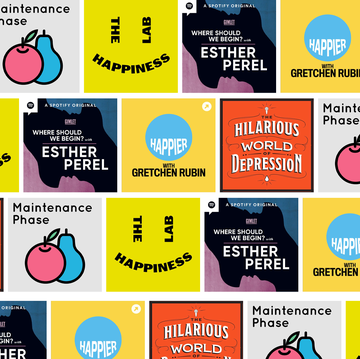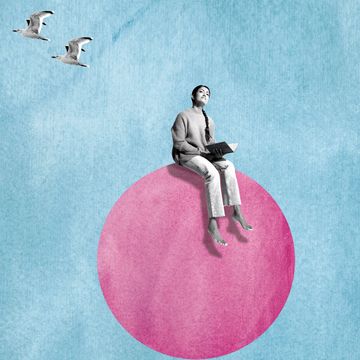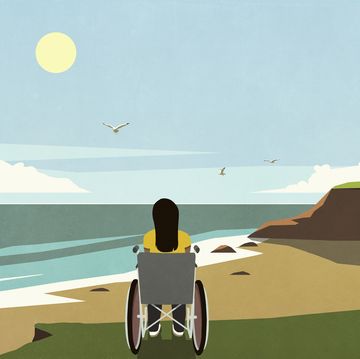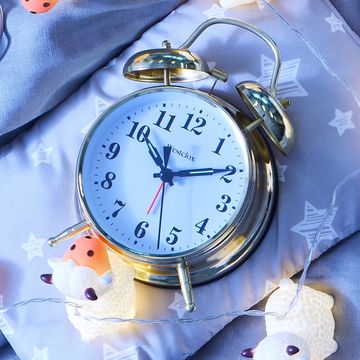Because it's the first month of summer vacation, June struck me as the perfect time to work on my play. In an irony that didn't escape me, I was prepared to work doggedly at fun and be serious about joking around. Lately, I'd been feeling as if I was just turning from one chore to another; I was feeling drained and overwhelmed. I knew I needed to make time for fun — but how? When I thought about it, I realized that there are three types of fun: challenging fun, accommodating fun, and relaxing fun.
Challenging fun is the most rewarding, but also the most demanding. It can create frustration, anxiety, and hard work. It consumes time and energy — especially when you're enjoying the challenging fun of mastering a new skill. Learning to play golf, say, means grappling with strange equipment, unfamiliar rules, new vocabulary, and awkward motions. In the end, however, challenging fun pays off with the most satisfying fun.
Usually less challenging, but still requiring a fair bit of effort, is accommodating fun. A family trip to the zoo is accommodating fun. A book-group meeting, a family birthday brunch, or even dinner and a movie with friends requires accommodation. It strengthens relationships, it builds memories, it's fun — but it takes effort, organization, coordination with other people, and, well, accommodation.
Relaxing fun takes no effort; no need to work on skills or make plans. Watching TV — the largest consumer of the world's time, after sleeping and work — is relaxing fun.
Research shows that challenging fun and accommodating fun, over the long term, make people happier, because they're sources of the elements that build happiness: strong personal bonds, mastery, an atmosphere of growth. Relaxing fun tends to be passive — we just pick up the remote control and plop down on the couch. So if relaxing fun is the least fun kind of fun, why is watching TV so popular? Because, while we get more out of challenging fun and accommodating fun, we also must put more into it. It takes energy and forethought. If most of your play is dedicated to relaxing fun, try to incorporate some challenging fun into your day.
I know that when I don't get enough sleep and exercise, for example, I feel too exhausted for challenging fun. I don't challenge myself to learn to use Photoshop, or plan a cocktail party, or play Restaurant with my 5-year-old. I look for relaxing fun. That's why energy is so important; without energy, I don't pursue the activities that make me happiest.
But I don't even know how to have fun, you may be thinking. A surprising number of adults spend so much time thinking about what they wish they found fun, or think they ought to find fun, or what other people find fun, that they've lost touch with how to have real fun.
If you don't know what to do for fun, ask yourself, "What did I do for fun when I was 10 years old?" You'd probably enjoy that activity now. Exploring the woods, playing with your dog, making things with your hands, riding your bike, baking, dancing around the room singing...think of ways to adapt this childhood fun to your life as an adult.
When I was 10 years old, for example, I spent hours working on my "Blank Books." I copied my favorite passages into blank scrapbooks, then illustrated them with pictures cut from magazines. This practice of copying, cutting, arranging, and pasting was one of the main activities of my childhood. As an adult, I reconnect with this childhood passion by working on my blog. It's fun in exactly the same way.
Just as many people don't know how to have fun, many people feel as though they don't have any time for fun. While it's easy to assume that fun should be spontaneous, you may have to slot it into your calendar like a dentist's appointment. Don't wait to squeeze in your fun when you have some free time — you may never have any free time.
As I thought about fun, I realized that I'd developed the tendency to be a bit of a killjoy. In my race to cross off items on my to-do list, I'd become very serious. "There's no time to goof around," I'd scold my family. "We need to get going."
When I started to think about fun, though, I realized the importance of silliness; a happy atmosphere isn't created merely by the absence of nagging and yelling. I made a resolution to "make time to be silly." Studies show that in a phenomenon called "emotional contagion," we unconsciously catch emotions from other people — whether good moods or bad moods. Taking the time to be silly means that we're infecting one another with good cheer.
It isn't always easy. For instance, my husband often plays a morning game with our younger daughter: While we're all getting ready for school or work, he comes into her room, as I'm prodding her to get dressed, and announces to her, "OK, I'm leaving for work now. Come give me a kiss." This is hilarious to my daughter — because he's wearing nothing but his boxer shorts! Or he's dressed but his feet are bare! This familiar exchange started to annoy me, because it slowed down our march through the morning checklist. But then I remembered, "Make time to be silly." We have time for a little goofiness, and it's such a nice way to start the day. Instead of chivvying them along, I've started to join in the fun.
I also realized that I needed to let go of my idea of what I wish I found fun. Wine tasting, editing home videos, making homemade pasta, getting a pedicure, learning French, exploring the app store on the iPad...these activities sound so fun, and I wish I did find them fun, and I see why other people find them fun — but I don't.
In a way, admitting my true likes and dislikes makes me sad. The world offers so much, and I'm too limited to enjoy it. Fly-fishing sounds so fun; why can't it be fun for me? If I tried harder, couldn't I enjoy jazz? Shouldn't I get past my love of breakfast cereal and try pâté? Now that I'm a grown-up, shouldn't I start inviting my friends over for elegant dinner parties instead of serving them takeout Chinese food?
But although acknowledging my true likes and dislikes showed me my limits, it also meant that I could spend my free time on activities that I honestly found fun. One of my happiness-project resolutions led me right back to my First Commandment: "Be Gretchen." I have to know and pursue what is truly fun for me. That's the road that leads to happiness.
Now that I've relinquished my fantasies of all the people I wish I could be, and stopped feeling guilty about not going to the opera or pretending that I want to attend a foreign policy lecture, I have more time for the things that I truly enjoy. For instance, now I have more time to read. Which is what I really find fun.
How do you find time for fun? E-mail me at Gretchen@goodhousekeeping.com.
Happiness Thought for June
Just because something is fun for other people doesn't mean that it's fun for you — and vice versa.













